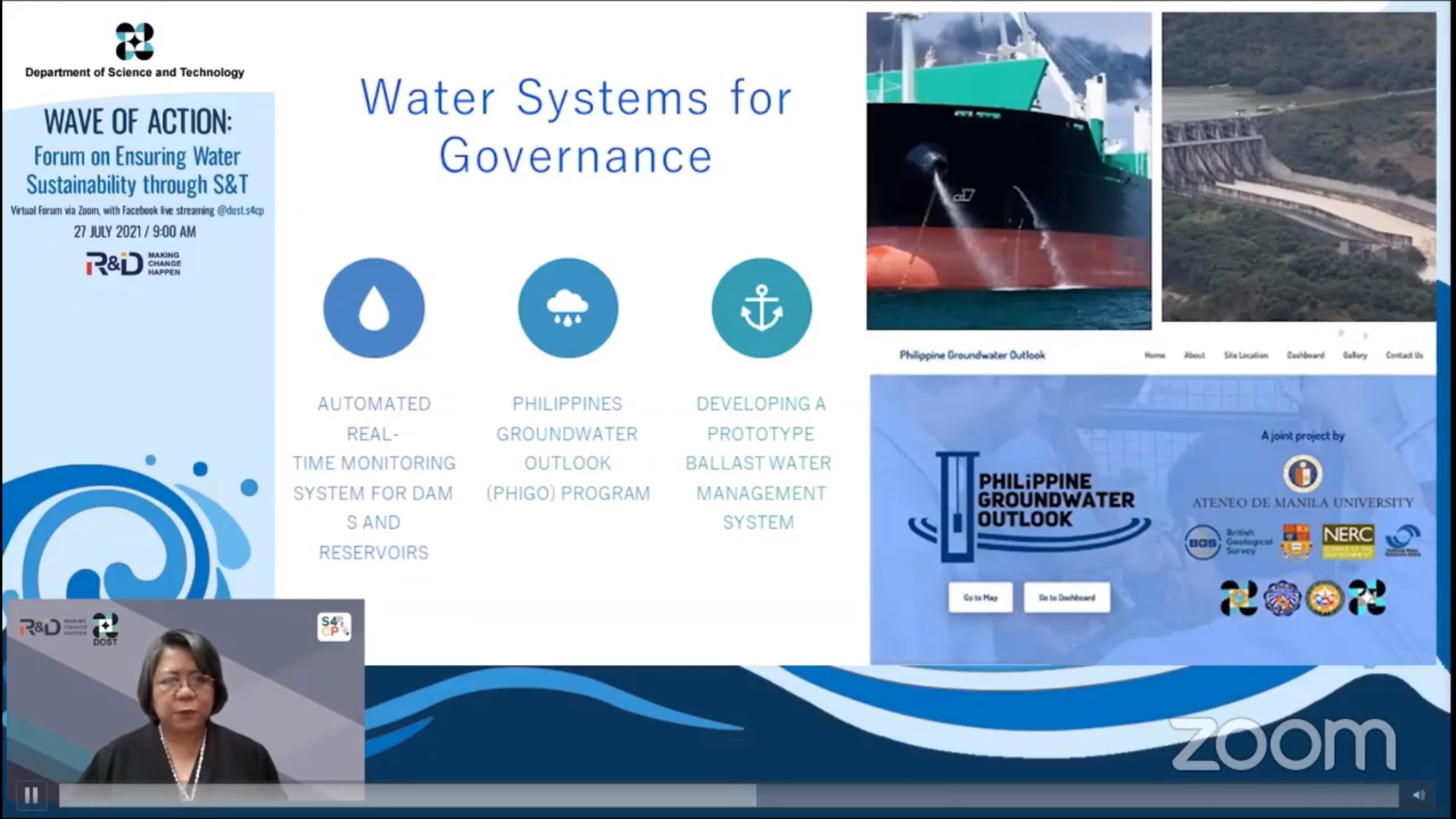DOST makes R&D programs on sustainable water resources a major priority

Water is a very valuable resource that greatly affects the quality of life of all and its use should be managed well for sustainability.
In the 2018 report of the National Economic Development Authority (NEDA), 12.32% out of 22.7 million households have no access to safe water supply, mostly from the indigenous and remote communities. Then, the concern on water sanitation also rises every rainy and typhoon season.
During the Wave of Action: Forum on Ensuring Water Sustainability through S&T held on 27 July 2021 via DOST-Science for Change Program Facebook Page, Secretary Fortunato T. de la Peña shared that the Department of Science and Technology (DOST) is putting water resource management as one of major priorities in their research and development (R&D) programs through partnership with both public and private sectors.
“We (DOST) have been able to contribute to the development and application of technology and systems that could help to improve our water resources management in the country,'' said DOST Sec.de la Peña.
Sec. de la Peña cited the collaboration of DOST-Philippine Council for Industry, Energy and Emerging Technology Research and Development (PCIEERD) with the National Water Resources Board (NWRB) have been collaborating in monitoring the conditions of our water resources. Additional to that is their Climate Resilient Initiative which provides scientific information on planning, critical infrastructure, particularly concerning climate change adaptation and disaster risk reduction.
The science chief also shared the partnership of DOST Regional Offices with local agencies and local government units to address this concern. He mentioned the application of solar-powered pumps in areas that are beyond reach of power lines like the ones installed in the Cordillera Administrative Region and MIMAROPA. This initiative aims to supply the domestic needs for livestock production and irrigation.
The DOST Region X is piloting a vertical helophyte filter system that filters pollutants in wastewater so that they can be recycled. Also, a forecasting model for complex water supply systems is being tried using the East Manila area as a pilot that was developed through the DOST’s Collaborative Research and Development to Leverage Philippine Economy (CRADLE). This is being done in cooperation with the Asian Institute of Management.
“We hope and foresee that shortly with the appropriate policies and management systems and technologies, we will be able to secure sustainable water management and sanitation for the benefit of all Filipinos.”, said DOST Sec.de la Peña.
Water sustainability towards a better future
In the same forum, DOST Undersecretary for Research and Development Dr. Rowena Cristina L. Guevara shared the water sustainability landscape in the country.
“Water can be easily thought of as an abundant resource, however, according to the World Wildlife Organization, only 3% of countries' water is freshwater that is suited for human use and consumption”, said DOST Usec. Guevara.
Usec. Guevara stressed that it is imperative to maximize its use and consider its accessibility for everyone. In the Philippines, it is estimated that we have only used 6% of the available water, almost 4.5 times lower in terms of utilization compared to other countries like Chinese-Taipei and Japan.
Recognizing this urgent need, the DOST initiated programs and projects related to water resources management, according to Usec. Guevara.
In the industry sector, the DOST-PCIEERD implemented over 30 projects amounting to 300 million since 2016 while in the agriculture sector, DOST-PCAARRD invested over 500 million over 40 projects that produced useful technologies for the environment, industry, and governance. Lastly, to accelerate these water initiatives, DOST also supports 22 projects with funding of over 270 million through the establishment of the Niche Centers in the Regions through R&D project or NICER and academic industry partnerships under the Science for Change Program.
Usec. Guevara also presented some of the department's supported projects which have contributed significantly in ensuring water sustainability through science, technology, and innovation.
She shared that DOST has deployed technologies that address water concerns in areas with high socio-economic importance, an example of which is the integrated system for monitoring water quality of Manila Bay that is one of our efforts in restoration. For Laguna Lake, the researchers are optimizing methodologies to determine organic compounds and heavy metals for better water quality management particularly in the aquaculture sector. Moreover, in Boracay, a science-based guideline for water resource assessment in a tourist island was also developed.
Usec. Guevara further emphasized that there are DOST-supported R&D projects that focus on the development of water technologies to improve crop, animal, and fisheries production. This initiative includes the drift irrigation technology for onion, peanut, garlic, and sugarcane.
“Also, we supported numerous projects related to watershed management and climate change which are needed to come up with science-based policies and decisions. One of these is the WAIS program or Water-Based Assisted Irrigation Decision Support System,” said Usec. Guevara.
According to her, the DOST’s NICER program serves as a platform for more R&D projects that address water related concerns. Two of these projects are the Mountain Engineering Centers that enhance the industrial competitiveness of Cordillera through the development of artificial groundwater recharge facilities for drought and flood mitigation and the Smart Water Infrastructure and Management in the Cagayan Valley that provides disaster resilient Infrastructure.
Lastly, there is the Center for Environmental Technologies and Compliance in Metro Manila which aims to support the local industries to comply with the environmental standards and centers for lakes. This project will also provide strategies for effective management and sustainability of lakes. (by Allan Mauro V. Marfal, DOST-STII)
In a virtual forum on ensuring water sustainability held on 27 July 2021, DOST Undersecretary for Research and Development Dr. Rowena Cristina L. Guevara provides the overview of the water sustainability landscape in the country. (Screenshot from DOST-Science for Change Program Facebook Page)

